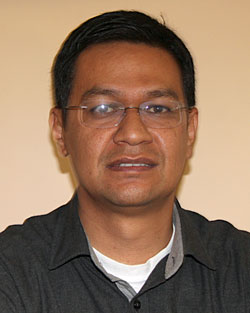Binay Bohra, head of the Internet Service Providers Association of Nepal (ISPAN), which shut down web access nationwide for an hour on Sunday, spoke to Nepali Times.
Nepali Times: Why did ISPAN declare an 'internet banda' on Sunday? 
Binay Bohra: In the past months police have detained or tried to detain directors and employees of Internet Service Providers (ISPs) because they provided internet connections to customers who were alleged to have misused our services for the call bypass racket. This is like holding a telephone company liable for abusive calls, or holding the maker of pressure cookers liable for their misuse as pressure cooker bombs.
But isn't it possible for ISPs to find out which subscriber is using connections for call bypass?
ISPAN sat down with the authorities and explained that the actions of its customers are a third party issue and need to be dealt in the way you deal with intermediary liabilities. The government agencies and police assured us that they would not be detaining ISP owners and staff. But just the opposite has happened. The threat of unwarranted police action has created an environment of fear among ISPs and is hampering our ability to provide services and conduct business.
No matter how and where we put our case and how much we cooperated with the agencies concerned, persecution against us did not stop. We simply want a safe working environment where we don't have to worry about going to jail because one of tens of thousands of internet customers misuses the service.
But isn't stopping the internet a bit extreme?
In a perfect society such action would not be needed. But we obviously don't live in a society where our concerns are heard and resolved. It was about protecting ourselves and our industry against an apathetic government and vindictive telecom operators who are determined to guard their expensive international call business to protect revenues and use government agencies to persecute small operators. We were compelled to take this extreme step out of desperation and as a last resort after exhausting all other options. The culture in our country has become one of protesting through bandas and sadly it has become the only form of protest that works.
But the police say ISPs knowingly allow some subscribers to use connections for call bypass operations?
Call bypass requires internet connectivity and access to the telephone network using mobile SIM cards. People involved in call bypass usually take internet connectivity from an ISP and bulk SIM cards from one of the large operators, Nepal Telecom, Ncell or UTL. When the police raid a call bypass operation, they identify the ISP that provided the internet connectivity and drag that ISP into the investigation.
But why can't you help the police crack down on criminals involved in call bypass?
When we suspect or discover that a customer is involved in call bypass, we pass this information to the police through the Nepal Telecommunications Authority (NTA). We have also taken pre-emptive action to screen high-bandwidth customers. We have improved the customer documentation process. NTA already has web access to ISPs' real time MRTG graphs to monitor the usage patterns of high bandwidth subscribers. So, the accusation that we have not provided data to the authorities is a lie.
Isn't call bypass good for the customer if it is cheaper? Why not just legalise it?
This should be the collective cry of all Nepalis, and it is our demand as well. Large telecommunication companies are charging unjustifiably high rates to poor Nepalis working overseas by making them pay through their noses to call home. Calling Nepal is among the most expensive of all countries in the SAARC region. This is because the big companies refuse to reduce their charges for incoming calls to Nepal. Illegal call bypass operators therefore
have a tremendous economic incentive, and had the rates been lower this activity would be reduced without the need for any police action.
In the meantime, what is the solution?
Just as Ncell and Nepal Telecom are not being held responsible for their SIM cards being misused for illegal call bypass, ISPs should not be held responsible for internet connectivity that is misused by its customers. Why this discrimination against ISPs? Obviously the big and strong have protection and we are a soft target. We are already cooperating. We are tired of living in an environment of fear, and would prefer to surrender our licenses to NTA than continue to work in this environment.


